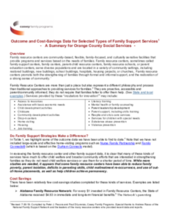This page contains documents and other resources related to children's care in the Americas. Browse resources by region, country, or category.
Displaying 1311 - 1320 of 3191
The purpose of this study was to describe the role of Public Health Nurses (PHN) addressing the needs of children and adolescents in foster care.
In this case study, the authors address a critical component of health care delivery for a vulnerable population by describing a process of developing an information sharing system between health care and child welfare organizations in collaboration with child protection community partners in the US.
The National Quality Improvement Center for Adoption and Guardianship Support and Preservation (QIC-AG) is a five-year project working with eight sites that will implement evidence-based interventions or develop and test promising practices which if proven effective can be replicated or adapted in other child welfare jurisdictions. This webinar presented learning from the project related to staffing and staff support, recruitment and retention, cost/sustainability, stakeholder collaboration, and logistics.
The primary aim of this study was to explore individual characteristics that could predict the quality of life and level of distress of foster care alumni.
This document from Casey Family Programs reviews data on Family Resource Centers and other family support services in the US.
Peer support is a form of support where foster parents connect formally with other foster parents with experience who can provide knowledge, emotional and practical help. The purpose of the present study was to identify what the needs are of foster parents in that peer support role from the views of peer support volunteers themselves.
This secondary analysis of data describing 3,035 parents, drawn from the National Survey of Child and Adolescent Well-Being II, identified factors fostering the collaborative alliance of parents and caseworkers within the child welfare system.
According to this article from the Guardian, the American Civil Liberties Union (ACLU) has reported that over 900 children have been separated from their families at the US border with Mexico after a judge's order last year "that the practice be sharply curtailed."
This study was conducted to address some of the gaps in the current literature by identifying, in a more comprehensive manner, family profiles and service referrals in cases of child neglect investigated and substantiated by Child Protection Services (CPS).
This study was conducted to address some of the gaps in the current literature by identifying, in a more comprehensive manner, family profiles and service referrals in cases of child neglect investigated and substantiated by Child Protection Services (CPS) in Quebec.


